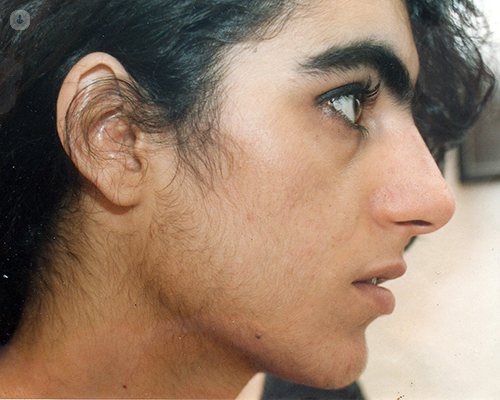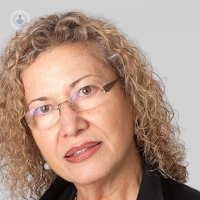Hirsutism – what causes excessive hair growth in women?
Written in association with:Hirsutism is the clinical condition of unwanted hair growth in women. It can occur around areas typical for male hair growth (known as androgen sensitive areas), such as the upper lip, chin, sideburns, chest, lower abdomen, intergluteal area, and thighs. The condition is caused by an excess of male hormones, or hyperandrogenism, which is biochemically defined as an elevation in the androgens in the woman’s blood, such as testosterone, androstenedione, or DHEA-S

What causes excessive male hormones?
The most common cause of excessive male hormones in the female body is polycystic ovaries syndrome (PCOS) (hirsutism is present in 70% of women with this syndrome). Rarer causes are adrenal hyperplasia, adrenal and ovarian tumours, and some medications. The condition known as idiopathic hirsutism refers to a mild or moderate hirsutism, occurring without an elevation of circulating levels of androgens in women who have a regular menstrual cycle.
What is the treatment for hirsutism?
The medical treatment of hirsutism is far from being completely successful, with the response rate varying between 20 to 95% depending on the drug, the dosage used, and the patient’s response to the treatment.
There are a number of ways that hirsutism can be treated. The most common therapies include:
- antiandrogen medication
- weight reduction
- cosmetic procedures (conventional electrolysis or laser hair removal)
- psychological support to help cope with any negative emotions the excess hair may cause
Antiandrogens
Antiandrogens are drugs that interfere with androgen action at the target organ. They either block enzyme reactions, thereby limiting the formation of potent androgens, or specifically block the androgen receptor in the skin. Some anti-androgens affect both enzyme reactions and androgen receptor.
A female foetus in utero is at risk of developing feminised external genitalia if his mother is having treatment with an antiandrogen. The use of adequate contraception is therefore essential while on an antiandrogen treatment course. Additionally most antiandrogens have various side effects, some of which are potentially dangerous. A specialist in the treatment of hirsutism will discuss your medication options, and the possible side effects.
Cosmetic procedures
While on antiandrogen hormonal treatment, it is beneficial to also have hair removal procedures. This provides an immediate effect while you are waiting for the long-term results of the hormone treatment.
Although electrolysis is advertised as permanent hair removal, in many women regrowth occurs. The combination of medical therapy to remove stimulus for new hair growth with the mechanical removal of established hairs (either conventional electrolysis or laser treatment), offers the best cosmetic results. In recent years laser hair removal has revolutionised the treatment of hirsutism.
Should you pluck your hair?
Patients should be advised that plucking of hairs causes irritation and stimulation of hair growth. In contrast, shaving does not cause hair to grow more rapidly. Depilatory creams should be avoided, particularly for the face, because they could cause irritation and pigmentation.
How long does treatment take?
Patients must be advised that a response to therapy may not be seen for six to 12 months. Some women may note a lighter hair colour, a slowing of the rate of regrowth and a decrease in the diameter of the hair shaft.
The response to therapy varies greatly not only between individuals, but also between different sites on the body which depends on the local rate of hair growth. The patient should also be clearly informed that treatment is effective only while the medication is in use. Adolescent girls who are beginning to develop hirsutism usually respond best to the medical therapy.
Once therapy has started, the patient’s progress can be monitored on the basis of both clinical appearance and laboratory tests. The effectiveness of treatment is best assessed in terms of a reduction in the time a woman spends in mechanically removing the hair. Patients who exhibit worsening of hirsutism or whose circulating androgens fail to decrease as expected on hormonal therapy, should undergo further evaluation.
If you are concerned about excess hair growth, make an appointment with a specialist in the treatment of hirsutism.


